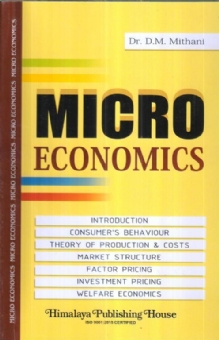Micro Economics
no information available
This "Microeconomics" textbook is crafted to meet the needs of graduate students following the UGC Model Curriculum 2002 for B.A. Economics (Pass/Hons.). With over 40 years of teaching experience, the author presents the complexities of microeconomics in a clear, systematic manner, ensuring students grasp fundamental concepts easily. The book covers key topics such as consumer behavior, production theory, market structures, and factor pricing while maintaining the required academic rigor. Each chapter is designed for self-study with logical, integrated explanations, making it ideal for university courses. Dive into the fundamentals of microeconomics with a comprehensive and self-explanatory approach. ... Read more Read less











